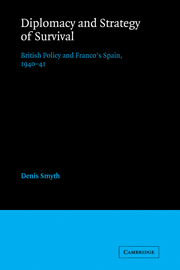Book contents
- Frontmatter
- Contents
- Preface
- Introduction
- 1 Britain and and the birth of Franco's Spain, 1936–39
- 2 Defining a policy
- 3 Opposition
- 4 The Spanish scene
- 5 Strategic diplomacy: September–October, 1940
- 6 Economic diplomacy: September–December, 1940
- 7 The Tangier crisis
- 8 The limits of attraction
- 9 The exhaustion of diplomacy
- Conclusion
- Notes
- Bibliography
- Index
9 - The exhaustion of diplomacy
Published online by Cambridge University Press: 05 November 2011
- Frontmatter
- Contents
- Preface
- Introduction
- 1 Britain and and the birth of Franco's Spain, 1936–39
- 2 Defining a policy
- 3 Opposition
- 4 The Spanish scene
- 5 Strategic diplomacy: September–October, 1940
- 6 Economic diplomacy: September–December, 1940
- 7 The Tangier crisis
- 8 The limits of attraction
- 9 The exhaustion of diplomacy
- Conclusion
- Notes
- Bibliography
- Index
Summary
In a dispatch which he sent to Lond, on 1 May 1941, Sir Samuel Hoare admitted that Spain was ‘shaking under the shocks’ of the recent British defeats in the Eastern Mediterranean. Nevertheless, he refused to subscribe to ‘the doctrine of Calvinist inevitability’ which deemed Spanish belligerency on the Axis side to be ineluctable. He therefore repeated his oft-expressed call for extensive Anglo-American aid to Spain, for a United States propaganda campaign there to publicise the scale of their support for Britain's fight, and for some effort to mobilise Latin American influence against Spanish adherence to the Axis. Makins of the Foreign Office, however, did not see that there was much more Britain could do to consolidate Spanish non-belligerency. He minuted, on 9 May 1941, in reaction to Hoare's advice, thus:
This despatch clearly reveals the extent to which the resources of our diplomacy in Spain are being used up. Sir S. Hoare, like a squirrel in a cage, returns again and again to the same points, which are already being dealt with as far as we can deal with them. His further proposals depend on action … by the U.S. Government, and the Ambassador is disposed to think that the Americans will readily dance to this tune. I am afraid he is somewhat overoptimistic about this.
- Type
- Chapter
- Information
- Diplomacy and Strategy of SurvivalBritish Policy and Franco's Spain, 1940-41, pp. 217 - 241Publisher: Cambridge University PressPrint publication year: 1986



